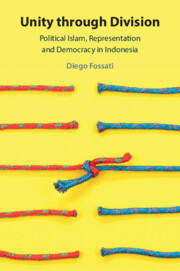Book contents
- Unity through Division
- Unity through Division
- Copyright page
- Dedication
- Contents
- Figures
- Tables
- Acknowledgments
- 1 Introduction
- 2 Explaining Democratic Survival in Indonesia
- 3 The Ideological Roots of Electoral Politics
- 4 Political Elites and Ideological Competition
- 5 Public Opinion on Political Islam
- 6 Ideological Representation
- 7 Meaning and Evaluation of Democracy
- 8 Conclusions
- References
- Index
5 - Public Opinion on Political Islam
Published online by Cambridge University Press: 15 September 2022
- Unity through Division
- Unity through Division
- Copyright page
- Dedication
- Contents
- Figures
- Tables
- Acknowledgments
- 1 Introduction
- 2 Explaining Democratic Survival in Indonesia
- 3 The Ideological Roots of Electoral Politics
- 4 Political Elites and Ideological Competition
- 5 Public Opinion on Political Islam
- 6 Ideological Representation
- 7 Meaning and Evaluation of Democracy
- 8 Conclusions
- References
- Index
Summary
This chapter moves to public opinion with an analysis of various surveys specifically designed to investigate perceptions of political Islam among ordinary citizens. First, it leverages the Indonesia National Survey Program dataset to show that ordinary people, like politicians, are divided in their views of political Islam, and it investigates various sociodemographic factors that are associated with this cleavage. Drawing from the same data, it further shows that political Islam is associated with participation and partisanship. It then analyzes a more focused survey conducted with an online sample to first explore the relationship between political Islam and national identity and, second, between Islam and populism, a key feature of contemporary Indonesian politics. The data analyzed in this chapter portrays a comprehensive figure of political Islam as perceived by the mass public, and to show that this cleavage is associated with a specific conception of national identity. To a certain extent, political Islam is also associated with policy preferences in important policy domains such as fiscal policy and decentralization, and with populist understandings of politics.
- Type
- Chapter
- Information
- Unity through DivisionPolitical Islam, Representation and Democracy in Indonesia, pp. 104 - 134Publisher: Cambridge University PressPrint publication year: 2022

